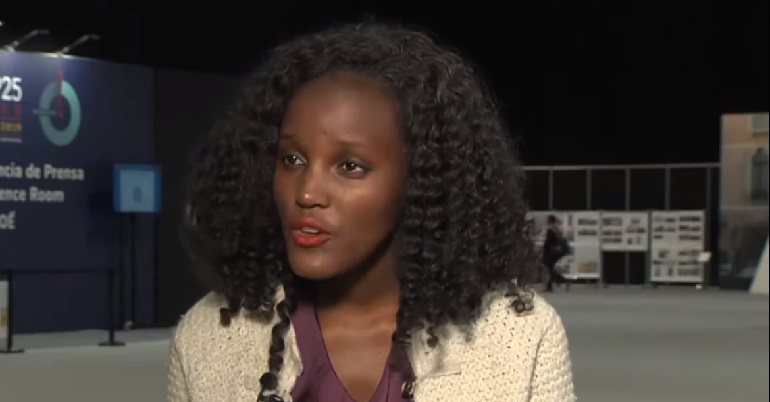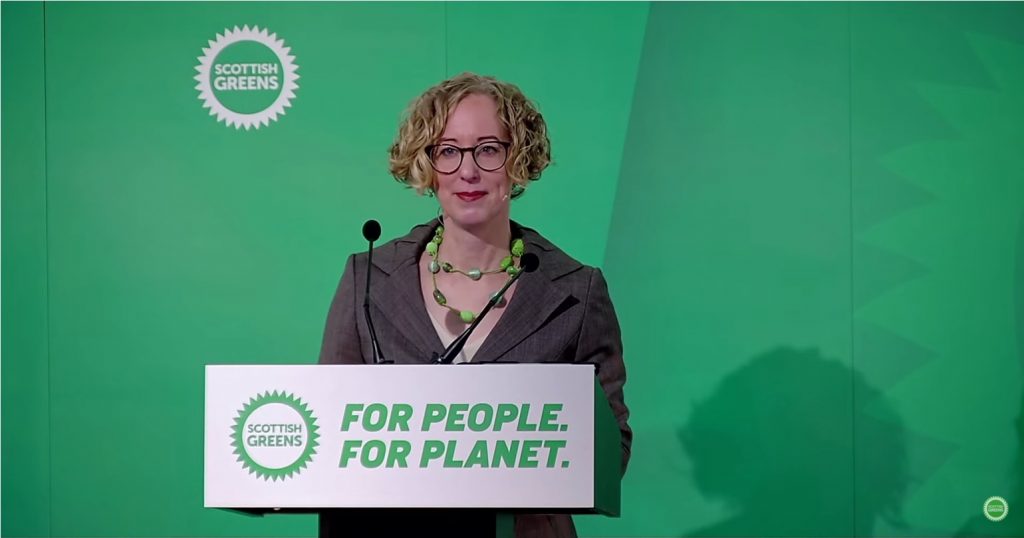What Vanessa Nakate being cropped out of a photograph tells us about climate change and race

The wider environmental movement has been criticised time and time again for being too ‘white’ and born from too much privilege. Many times, I have jumped to the defence of the movement and attempted to justify the lack of inclusion in our battle for a sustainable planet. Wrongly, I have made excuses or felt the blame lay elsewhere and in turn have massively let the movement off the hook. This will no longer be the case.
On Friday, Vanessa Nakate, Ugandan Climate Activist and founder of Youth for Future Africa, joined young climate activists from across the world, including Greta Thunberg, and delivered a ground-breaking press conference at the World Economic Forum in Davos. This should have been a momentous occasion – 5 powerful young women telling truth to power and demanding urgent climate action. However the euphoria was short-lived with what came next. In a bid to capture the historic occasion, the Associated Press gathered the activists together and took a picture ready to share this significant moment with the world. Sounds good so far, right?
Wrong. For reasons the Associated Press failed to coherently explain, Ugandan activist Vanessa Nakate was unceremoniously cropped out of the picture, leaving her four contemporaries as the faces which beamed around the globe as the young activists shaping the world. The significance of this cannot be understated. It is simply no coincidence that the only person who was not included was the only person in the picture who is not white. As a person of colour working hard to be heard within the climate movement, I felt that pain too.
Non-white voices are rarely heard in the climate movement and naively I thought that maybe it was because we are few and far between. What this has shown me is that even if these voices do exist, the power of the media means that unless they are amplified, we do not hear them. Why does the media choose to amplify the voices of European climate activists when those directly affected by climate change now are kept in such silence? And why, when people of colour do manage to get our voices heard, on one of the biggest platforms available to us, the media then edits us out, so we appear silent once again?
It is these questions which make me wonder how much progression there has been in valuing the voice of a person of colour. The wider environmental movement still has many lessons to learn and is also largely culpable in the events of Friday. If much more time and effort had been spent over the last 18 months to include people from all backgrounds, including those directly affected by climate change, it would not have been normalised for the press to so brutally crop out an exceptional activist from their photo without a seconds thought. I have been pleased to see the outrage shown since this event, from activists and commentators alike, but if the movement was more inclusive from the start, these events would not happen in the first place.
There is still so much more work to do for the climate movement to be more racially diverse and inclusive. From questioning the notion of what it means to be ‘arrestable’ at a protest to ensuring we amplify the voices of ALL of those affected by climate change, there is work to do for all of us, myself included.
The Associated Press have now issued a belated apology, however this still doesn’t explain how this was allowed to happen in the first place. The important thing now is making sure this never happens again, and nobody is made to feel how Vanessa Nakate must have felt last Friday.
Image credit: Democracy Now! YouTube Screengrab




Can we have an article about what Vanessa Nakate has been striking about in Uganda more specifically her efforts on raising awareness about the Congo Rainforest. All I have seen is articles about the wider movement and media being white, which is true and needs to be addressed, but I feel saddened that like the rest of the media this is all that is talked about. Vanessa has been campaigning for over a year now begging for attention on how the ecology is being damaged in Africa in different nations and also how different nations are being impacted. Btw she was at COP25 too with other climate activists another whitewash/greenwash event.
Thank you, Sally.
Responses to your request would shift this discussion back onto core issues.
Environmental issues affect all of humanity. Race & colour are utterly irrelevant. We all need to work together and to learn from each other.
I, for one, would certainly love to hear more about Vanessa’s “efforts on raising awareness about the Congo Rainforest”, and her broader advocacy and involvements such as at COP25.
There’s great scope for an even broader range of articles here. A comprehensive response to your request would broaden international awareness of ecological realities on an often-overlooked continent. Such articles would celebrate many courageous, innovative initiatives originating there.
Thanks, again, Sally. You’re right, and you stated your case beautifully.
Thank you, too, Tyrone.
Thank you for sharing this candid, necessary reflection on culpability within both the global media and the global environmental movement. I myself, the environmental movement in particular, and the world in general can all benefit from seeing what has happened here and then learning lessons of inclusion and of balance from this.
Ugandan activist Vanessa Nakate has come to world attention as a victim of cavalier media exclusion. She deserved international recognition for better reasons.
Now, in the spirit of Sally’s request, I hope we can all look forward to meeting Vanessa again – and to meeting others like her – in the positive contexts of their inspiring public advocacy.
Let’s look forward to articles focused on environmental issues and on creative, effective responses.
We all have a lot to learn from each other.
Hi Sally,
Thanks for the comment. I wrote the piece with that specific angle at mind however you are correct in that we should concentrate more on the excellent work she has done to fight for climate justice across Uganda.
I agree with this. Do an interview with Vanessa about what she has been striking for, what the issues are, and what can be done.